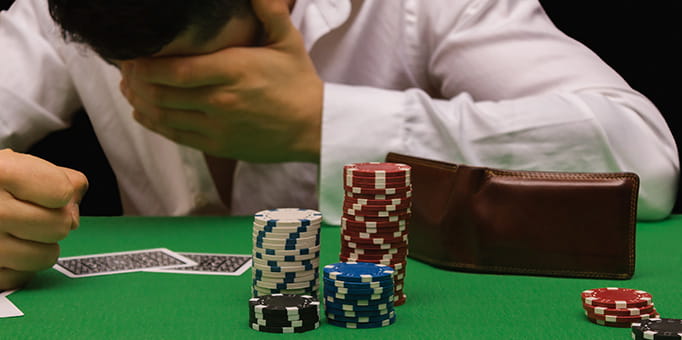Key Signs of Online Gambling Addiction – Most Noticable Symptoms
Despite the relatively immature nature of the US gambling market, the legalization and exponential growth of sports betting since May 2018 has created a marketplace that was worth $10.92 billion in 2023. The six US states that have legalized online casino betting also generate significant revenues through iGaming, with Americans now wagering more than they have ever done before.

Typically, this type of growth also creates a higher prevalence of problem gambling, with this trend borne out in countries such as the UK. This is why many betting brands active in the US have comprehensive responsible gambling practices, which can help to safeguard players who may have recognized signs of online gambling addiction.
- Preceding the Signs of a Problem Gambler – How Does a Gambling Addiction Occur?
- Gambling Addiction Symptoms – How Compulsive Betting Affects You Mentally
- The Impact of Gambling Addiction on Your Behavior
- How to Recognize These Symptoms and Prevent the Onset of Gambling Addiction
- The Last Word
Preceding the Signs of a Problem Gambler – How Does a Gambling Addiction Occur?
Before we take a closer look at the most telling compulsive gambler symptoms, it’s important to develop a broad understanding of how this type of addiction occurs in the first place. After all, addictions of this type are rooted in detailed psychological mechanics and processes, and often progress in the same way (albeit over variable periods of time).
When we gamble, we occasionally achieve wins, depending on our choice of gambling vertical and how frequently we wager. A winning bet will release the feel-good chemical dopamine into our brains, and this will occur every time we win money and recoup some of our starting bankrolls.
Enjoying successive wins or a string of victories can encourage us to gamble more, and more frequent betting means that our brains become more accustomed to receiving dopamine hits. Over time, this makes it harder to achieve the same rush or sensation when placing winning bets, and we may respond to this by wagering high stakes or gambling more frequently.
Both of these compulsive behaviors can lead to a full-scale gambling addiction, while causing you to wager outside of your means, incur significant debt and suffer a dramatic impact on all areas of your life. This is why it’s so important to recognize the key gambling addiction symptoms and how they may impact on your everyday life.
Gambling Addiction Symptoms – How Compulsive Betting Affects You Mentally
There are different types of gambling addiction symptoms, although these can broadly be broken down into two distinct categories. The first of these include emotional symptoms, which may occur when you gamble recklessly or outside your means for an extended period of time or in instances when you attempt to stop betting.
Such symptoms can vary from one individual to another, of course, but it’s important to understand how compulsive gambling can impact your emotional and mental wellbeing over time. So, here’s a summary of the emotional signs of online gambling addiction and how they may manifest in individuals.
- Low Self-Esteem: In instances where you start to gamble outside your means and accumulate debt; you may begin to mislead others or borrow more heavily. This can directly impact your self-esteem over time, as you begin to experience feelings of worthlessness and even hopelessness as your financial plight worsens.
- Increased Stress: Of course, becoming indebted to loan and credit card companies can also cause increased levels of cortisol and stress. This is particularly true in instances where you start to miss payments and incur greater interest on your debt, while this can even overcome the dopamine hit that you achieve when wagering large amounts of real money.
- Anxiety and Depression: If your debt levels do mount significantly during the course of problem gambling, you may begin to be contacted regularly by creditors or debt recovery agencies. This means that gambling losses become increasingly devastating and impactful, leading to symptoms of anxiety and depression that may be exacerbated when you bet money.
- Feelings of Restlessness and Irritability: People with a gambling problem will typically experience negative emotions that are directly linked to the act of betting or choosing not to wager. For example, you may feel restless or irritable when you gamble and continue to lose money, or experience similar symptoms when you try to cut down or manage your activity more stringently.
- Guilt: For bettors who borrow money off friends and loved ones or have a family, excessive or compulsive gambling may also inspire feelings of guilt and regret. This is especially true if you have borrowed money that you cannot afford to repay or have removed cash from a joint bank account without consent or under false pretenses. Such emotions can often be overwhelming and difficult to contend with.
The Impact of Gambling Addiction on Your Behavior
We’ve already touched on how problem gambling can lower our inhibitions when it comes to borrowing money and taking on unmanageable amounts of debt. This is just one way in which compulsive betting can impact your behavior over time, so here are some other corporeal problem gambling symptoms to keep your eyes peeled for.
- Being Preoccupied with Gambling: This may sound obvious, but being preoccupied with gambling is one of the main physical symptoms of compulsive betting. Certainly, if you find yourself consumed by thoughts of gambling or how to increase your bankroll and wager more frequently, you may be in the early stages of addiction and see other areas of your life begin to be impacted negatively.
- Needing to Gamble with Increased Amounts of Cash: It can be hard to track your betting activity over time, especially if you’re preoccupied with chasing ever-increasing payouts and increasing your bankroll. However, problem gamblers often find that they have to wager more or at an increased frequency to get the same thrill as they did before. Remember, this behavior has a psychological foundation and is widely observed among compulsive bettors.
- Making Attempts to Control or Minimize Your Gambling Activity: As we’ve already touched on, you may make attempts to cut back on your betting activity during the early stages of gambling compulsion. However, this may lead to feelings or restlessness or irritability, meaning that such attempts are ultimately unsuccessful. This may encourage you to stop trying over time and cause you to lose control over your betting activity.
- Lying to Family Members and Friends: Another of the most telling gambling addicts’ behavior is lying extensively, particularly to friends, loved ones and family members. Such lies will often seek to mask or hide the precise extent of your gambling, or the level of debt you’ve incurred through your behavior. These lies may also become increasingly pervasive and damaging as your addiction worsens.
- The Loss of Income and Relationships: As you continue to lie and mislead your loved ones, you may see personal and professional relationships strain and ultimately break. This is particularly true in the case of spouses and children, who tend to be the most directly affected by your compulsive gambling. Your preoccupation with gambling can also cost you jobs and income streams, exacerbating your financial issues and forcing you to bet more.
How to Recognize These Symptoms and Prevent the Onset of Gambling Addiction
Now that we’ve discussed the signs of online gambling addiction, it’s important to be proactive in your approach and take steps to tackle them directly. This can prevent compulsive behaviors from taking hold over time, while enabling you to regain control of your betting activity and financial security. So, here are some ways in which you can stop symptoms from evolving into behavoral patterns.
- Recognize the Symptoms of Problem Gambling: We’ve gone into tremendous detail about the emotional and behavoral symptoms of problem gambling. It’s important to understand these in detail, so that you can recognize them in yourself and act quickly to stop them from progressing. One way in which you do this is by logging or tracking your betting activity, with most licensed sportsbooks enabling you to do this through your online account.
- Set a Fixed Bankroll: If reckless spending is one of the key signs of a problem gambler, then it makes sense that you should set a fixed bankroll. This must not exceed an amount of money that you can comfortably afford to lose, while it should also cover a finite period of time depending on how frequently you wager. Once again, you can use online and personalized deposit limits to help manage your bankroll.
- Understand the Events That You Bet On: Whether you bet on casino games or sports events, loss is an inevitable part of gambling. This varies from one vertical to another, however, so try to understand the individual games or events that you bet on and their return-to-player (RTP) rates. When sports betting, you should also use odds to calculate the implied probability of outcomes from occurring and tailor your stake amounts accordingly.
- Don’t Chase Losses: One of the other overt signs of a problem gambler is the desire to spend more in the pursuit of increasingly sizable wins. This is often required to recover previous losses, but this once again misunderstands the opportunistic nature of gambling and inevitability of loss. So, never try to chase losses or use negative progression betting systems that encourage this type of behavior.
- Consider Time-Outs or Self-Exclusion: In addition to offering account history and deposit limit tools, most licensed sportsbooks in the US also enable you to take time-outs. You can also self-exclude from gambling for a fixed period of time, with this ideal in instances where you’ve experienced compulsive betting symptoms and want to take a break from the marketplace. You can also speak to customer support if you’re seeking initial advice.
The Last Word
Most gambling addictions and compulsive betting behaviors are borne from an accepted psychological process, through which wins deliver dopamine hits to the brain. The brain can become accustomed to such hits and encourage you to bet more to achieve the same sensation over time, especially if you bet on a regular basis.
If you begin to experience initial symptoms of problem gambling, you should also note that these can impact you in a number of different ways. You may experience emotional and behavioral symptoms, for example, many of which may be interconnected and likely to worsen over time.
This is the first step to addressing symptoms and regaining control of your behavior, as you look to prevent compulsive behaviors from scaling into a life-changing addiction. Remember, although developing a gambling addiction is rare, it has the potential to negatively impact every area of your life in a very meaningful way.
 By Lewis Humphries,
By Lewis Humphries, What are the Biggest Examples of Sports Superstitions?
What are the Biggest Examples of Sports Superstitions? What are the Weirdest Olympic Sports?
What are the Weirdest Olympic Sports? Exploring the History of Native American Casinos: A Detailed Guide
Exploring the History of Native American Casinos: A Detailed Guide Best WNBA Players of All Time and Now
Best WNBA Players of All Time and Now States Where Online Gambling is Illegal and the Reasons Why
States Where Online Gambling is Illegal and the Reasons Why Ranking of All-Time Biggest Lottery Winners
Ranking of All-Time Biggest Lottery Winners Top 15 Casino Movies on Netflix Streaming Right Now
Top 15 Casino Movies on Netflix Streaming Right Now All You Need to Know About the NCAA Tournament 2023
All You Need to Know About the NCAA Tournament 2023 10 Niche sports you can bet on in the US
10 Niche sports you can bet on in the US The Best NFL Team Ever
The Best NFL Team Ever